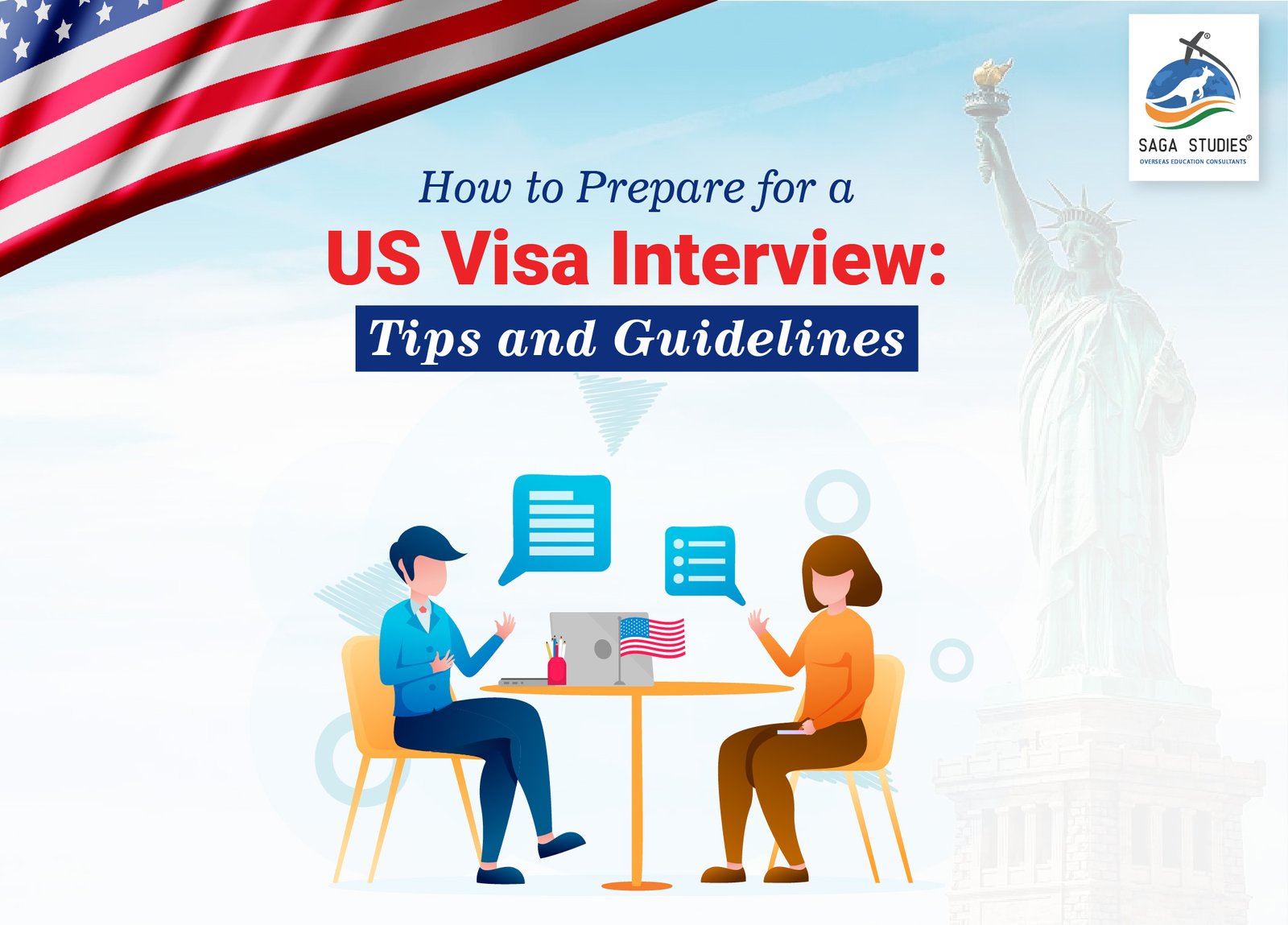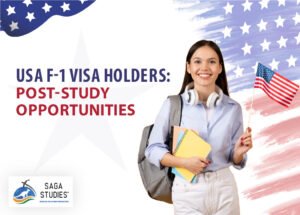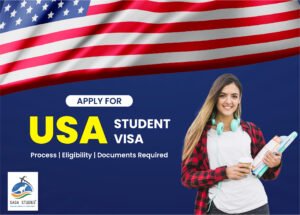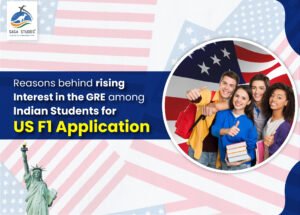Introduction
The US visa interview is a crucial step in the visa application process. For students dreaming of studying in the United States, acing this interview is important to secure a visa. In this blog, we will walk you through everything you need to know to prepare for a US visa interview. With the right preparation and mindset, you can face the visa officer confidently.
What is a US Visa Interview?
The US student visa interview is an essential part of the visa process, as it helps the consular officer understand your intent and plans in the United States. Furthermore, the interview aims to assess if you qualify for a visa. Therefore, a successful interview significantly boosts your chances of getting a US student visa, allowing you to study in USA.
All About the USA F1 Visa
The F1 visa is the most common type of visa for students seeking to study in the USA. Moreover, it allows international students to study full-time at a recognized institution. The US student visa interview is conducted to confirm your educational plans and ensure you have the funds to support yourself during your studies. Therefore, to successfully obtain an F1 visa, it is vital to be well-prepared and demonstrate your genuine intent to study.
Tips to Prepare for a Successful Visa Interview
- Practice Your Answers: Knowing what questions might be asked can help you prepare clear and concise answers. Conduct mock interviews with someone playing the role of the consular officer. This helps you practice your responses under pressure and fine-tune your answers.
- Know Your Program and University: Make sure you know the details about your university and the program you have chosen. The visa officer may ask why you chose that specific course.
- Be Honest and Clear: Answer all questions honestly and clearly. Avoid giving false information, as it could lead to rejection.
- Dress Appropriately: First impressions matter. Dress formally for the interview, as this demonstrates your seriousness.
- Show Financial Stability: Be prepared to show proof of funds that will cover your tuition fees and living expenses.
- Demonstrate Strong ties: In addition to demonstrating ties, express your commitment to returning home by outlining a specific career path in your country that aligns with your qualifications. Furthermore, emphasize how your skills will contribute to your home country’s development.
- Keep a Positive Attitude: A positive mindset can leave a good impression. Even if you feel nervous, remember to stay calm and maintain eye contact.
Things to Avoid During a Visa Interview
- Do Not Provide Inconsistent Information: Consistency is key. Giving inconsistent answers can result in a denial.
- Avoid Long Pauses: Long pauses can make it seem like you are unsure or hiding information. Practice beforehand to avoid hesitation.
- Do Not Volunteer Unnecessary Information: Answer the questions asked, but do not provide additional details that are not needed.
- Avoid Arguing or Being Defensive: Keep a polite tone throughout the interview. Being argumentative will reflect poorly on you.
- Nervous Body Language: Avoid fidgeting, looking away, or appearing too anxious. These behaviors can suggest a lack of confidence or that you might be hiding something. Instead, maintain good posture, make natural eye contact, and give a polite smile to show you are calm and confident.
- Dishonest Answers: Giving false information or contradicting your application can create issues immediately. Always be truthful and make sure your answers match the documents you provided.
Documents Required for the US Visa Interview
- Valid Passport: Your passport must be valid for at least six months beyond your intended stay.
- Form DS-160: Confirmation of your online application form.
- SEVIS Fee Receipt: Proof of payment of the SEVIS fee.
- I-20 Form: Issued by your school, this form proves you are admitted to a US institution.
- Financial Documents: Proof of funds to cover tuition and living expenses.
- Academic Records: Provide transcripts, diplomas, and standardized test scores (TOEFL, IELTS, GRE, GMAT) to demonstrate your academic background and preparedness.
- Admission Letter: Bring evidence that you were accepted to a United States educational institution.
- Interview Appointment Confirmation: Proof of your visa interview appointment.
- Application Fee Payment Receipt: Proof of payment of the visa application fee.
Develop Strong Responses to Common Interview Questions
Preparing for an interview can feel overwhelming but knowing what questions to expect and preparing responses can boost your confidence. Here are common interview questions and strategies to answer them effectively.
1. Why did you choose this specific program and school?
Be Specific: Mention unique aspects of the program like courses or professors.
Connect with Career Goals: Explain how the program fits your career aspirations and benefits your home country.
2. What are your future plans after completing your studies?
Show Long-Term Vision: Share your plan to return home and work in your field.
Describe Potential Opportunities: Mention job offers or career prospects in your country.
3. How will you finance your education?
Detail Your Financial Plan: Clearly explain your funding sources, like family support or loans.
Include Years Beyond the First Year: Show you’ve planned for the full cost of your program.
4. Why are you not studying this program in your home country?
Highlight Unique Opportunities: Discuss advantages like specialized facilities or international research opportunities.
5. Do you have family members in the U.S.?
Be Honest: It’s fine if you have family there. Just emphasize that your primary goal is to study and return home.
Final Checklist
Preparing for your U.S. student visa interview is essential for making a strong impression. Here’s a quick checklist:
Dress Professionally: Wear formal business attire to show your commitment and respect for the process.
Organize Documents: Double-check and arrange all required documents for easy access, reducing last-minute stress.
Arrive Early: Plan to arrive 15-20 minutes ahead to stay calm and focused.
Stay Positive: Show confidence and enthusiasm for studying in the U.S.; it leaves a positive impact.
Frequently Asked Questions (FAQs)
- Can I Mention Optional Practical Training (OPT) or Work Opportunities?
Yes, you can mention OPT, but keep it brief. Optional Practical Training allows you to gain practical experience in your field, which can be a great addition to your career plan. Additionally, highlight how this experience will help you achieve your career goals upon returning to your home country. However, avoid giving the impression that your primary focus is working in the U.S.
- How Much Financial Support Should I Show?
You’ll need to show sufficient funds for at least your first year of study as specified on your I-20 form. Further to strengthen your application, demonstrate that you have adequate financial resources to cover the remaining years as well. This shows the visa officer that you’re prepared for the entire duration of your program.
- What If My Family Can’t Fully Support Me?
If your family cannot fully fund your studies, you can show support from additional sponsors. Ensure they provide official documentation of their income and assets. Furthermore, presenting a well-organized budget that includes all sources of support, such as loans, savings, and scholarships, can reassure the officer of your financial preparedness.
- Why Didn’t I Choose a Program in My Home Country?
If asked why you chose a U.S. program over options at home, explain what makes the U.S. program unique. It could be specialized courses, advanced research facilities, or collaborative opportunities that aren’t available in your country. Additionally, emphasize how these features align with your educational and career goals.
- Do I Need Exact Travel Plans After Getting My Visa?
No, exact travel dates aren’t necessary, however you should know the start date of your program and have a general idea of your travel plans. This demonstrates that you’re well-prepared and have thought ahead about your move to the U.S.
- What Should I Do If My Visa Application Is Denied?
If your visa application is denied, ask the officer for the reason. Then address the issue before reapplying, as some common reasons for denial include unclear financial plans, weak academic ties, or lack of intent to return home. Understanding the reason will help you strengthen your application for future attempts.
Conclusion – Choose Saga Studies for Visa Application
Ready to take the next step in your visa journey? Let Saga Studies be your partner in making your US study dream come true.
Preparing for a Visa interview can be overwhelming, but with the right approach, it is manageable. At Saga Studies, we offer professional guidance to help you through every step of the visa application process. Our experts provide personalized assistance and conduct mock interviews, ensuring you are well-prepared and confident during your interview. Choose Saga Studies for a smooth and successful visa application journey.




